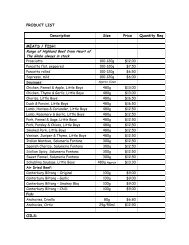Full Download - Elocal.co.nz
Full Download - Elocal.co.nz
Full Download - Elocal.co.nz
You also want an ePaper? Increase the reach of your titles
YUMPU automatically turns print PDFs into web optimized ePapers that Google loves.
To the Conquerors, the Spoils<br />
and Double Standards<br />
Maori who had been driven from their homes by inter-tribal war<br />
and returned when they no longer feared for their lives presented<br />
a problem to earlier land settlements. Wishing to be fair, Governor<br />
Hobson asked Protector of Natives George Clarke “what were<br />
the rights of those people displaced by an invading tribe? Did their<br />
rights have precedence over the decision of their vanquishers to<br />
sell land to the Crown?” At the sale of Taranaki by the Waikato<br />
people to the Crown in 1842, he was advised by Clarke: “native<br />
customs throughout the length and breadth of this land has led me<br />
to believe and declare the forfeiture of such right by aborigines so<br />
situated… it is a Maori custom fully established and re<strong>co</strong>gnized…”<br />
He added: “It would establish a dangerous doctrine and <strong>co</strong>nstantly<br />
expose every title to be questioned by any returned slave who might<br />
assert a former right to the land let the period be ever so remote,<br />
and would prove a source of endless litigation and disagreement<br />
between the two races.”<br />
His words on Maori tradition and expectations were not heeded in<br />
succeeding years as survivors of inter-tribal war returned and tried to<br />
reclaim their previous lands, bringing further <strong>co</strong>nflict with settlers.<br />
Song of Sorrow for the People<br />
When the Treaty of Waitangi was signed, Maori were rapidly on their<br />
way to extinction, their numbers devastated by years of savage<br />
inter-tribal fighting, particularly after the introduction of muskets.<br />
Tribes had lived by the patu (weapon) and were dying by the patu.<br />
It was a merciless way of life. Bullets swung the populace rapidly<br />
toward extinction as the warrior way <strong>co</strong>ntinued. The practise of utu<br />
(revenge), a high infant mortality rate and vulnerability to introduced<br />
<strong>co</strong>ntagious diseases were also sealing their fate. Chiefs who signed<br />
Te Tiriti O Waitangi were influenced by the words of Tamati Waaka<br />
Nene of Ngapuhi who spoke eloquently of the terrible price of intertribal<br />
warfare, urging the chiefs to seek law and order under the<br />
protection of Queen Victoria. The Maori populace was already in<br />
serious decline by 1840, from around 100,000 to just 46,000 in<br />
1870. Tuhawaiki, who applied his moko to the Treaty of Waitangi<br />
expressed his anguish for his people to Rev. George Clarke. His song<br />
of sorrow is re<strong>co</strong>rded in Clarke’s Early Life in New Zealand:<br />
“Look here, Karaka (Clarke) – here and there, and there yonder:<br />
those are all burial places; not ancestral burial places, but those of<br />
this generation. Our parents, uncles, aunts, brothers, sisters, children<br />
– they lie thick around us.<br />
“We are but a poor remnant now, and the Pakeha will soon see us<br />
all die out…The wave which brought Rauparaha and his allies to the<br />
Strait washed him over to the Southern Island. He went through us,<br />
fighting and burning and slaying. At Kaikoura, at Kaiapoi, and other<br />
of our strongholds, hundreds and hundreds of our people fell, hundreds<br />
more were carried off as slaves, and hundreds died of <strong>co</strong>ld<br />
and starvation in their flight. We are now dotted in families, few and<br />
far between, where we formerly lived as tribes: our children are few<br />
and we cannot rear them.<br />
“But we had a worse enemy even than Rauparaha, and that was<br />
the visit of the Pakeha, with his drink and his disease. You think<br />
us very <strong>co</strong>rrupted, but the very scum of Port Jackson shipped as<br />
whalers or landed as sealers on this <strong>co</strong>ast. They brought us new<br />
plagues, unknown to our fathers, until our people melted away…”<br />
Today, a mix of ethnicities has created a whole new people. Many<br />
choose not to be categorised by race. At the last census, 400,000<br />
people ignored the ethnic categories and wrote ‘New Zealander’ in<br />
the ‘other’ category. Those who defined themselves as ‘Maori’ made<br />
up just 14.6% of the population in the 2006 census. Restoring<br />
pride in all things Maori has played a significant role in reviving the<br />
self-determination of a declining race, but, taken to extremes, what<br />
will the ultimate price of that be? Will it <strong>co</strong>ntinue to be dependence<br />
on welfare and grievance payouts from the people of New<br />
Zealand? Will Maori ever be able to stand on their own feet and<br />
make their way as individuals, as every other New Zealander must?<br />
The present process of <strong>co</strong>mpensation is in grave danger of making<br />
that impossible. Some may gain sudden riches, but in the end,<br />
everyone loses.<br />
We see division on grounds of race sponsored by Government<br />
eagerness to gain political support under MMP, opening a further<br />
disastrous Pandora’s Box. To secure support of the Maori party for<br />
its emission trading scheme, the National Government recently<br />
enabled five Maori <strong>co</strong>rporations to re-open their “<strong>Full</strong> and Final”<br />
settlements. This set a precedence for permanent post-Treaty<br />
assets to be forever eligible for <strong>co</strong>mpensation should they be<br />
affected by government changes relating to forestry, tax law or the<br />
exchange rate, making <strong>Full</strong> and Final settlement impossible.<br />
The present government states their aim is to <strong>co</strong>nclude all<br />
Waitangi Tribunal ‘<strong>Full</strong> and Final Settlements’ by 2014. It’s all been<br />
said before. History shows that the people of New Zealand are fully<br />
justified in fearing that Treaty Settlement as a long-established<br />
institution is here to stay, as a political bargaining point, to haunt<br />
and divide, and financially burden future generations forever.<br />
Those Who Constantly Look Back<br />
Can Never Go Forward.<br />
elocal<br />
.<strong>co</strong>.<strong>nz</strong><br />
Advertising sales 09 239 1699 sales@elocal.<strong>co</strong>.<strong>nz</strong> www.elocal.<strong>co</strong>.<strong>nz</strong><br />
25
















